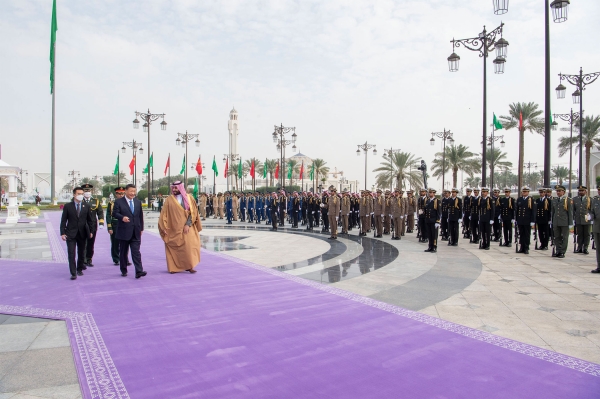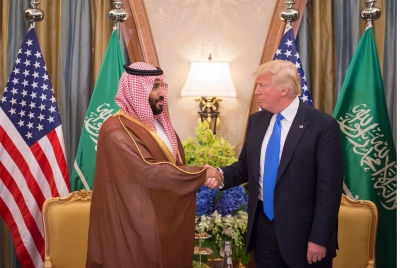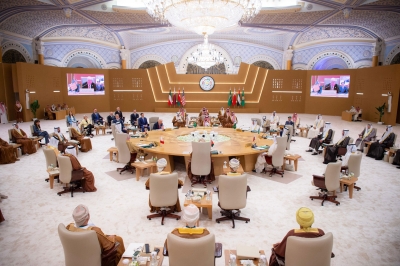

Saudi-Chinese relations are diplomatic relations established between the Kingdom of Saudi Arabia and People's Republic of China. Initially, the relationship was simply a trade confined to receiving Chinese pilgrims. Then in 1990, both countries agreed on establishing full diplomatic relationships and exchanging ambassadors. The relationship was established as per the Kingdom's perspective on external policy that aims at building relationships in favor of the nation's interest and diversifying the diplomatic connections with all nations in accordance with the Kingdom's principles.
Strengthening Saudi-Chinese relations
In 2008, the two countries strengthened their relations by announcing the establishment of a "strategic friendship," with the goal of fostering stronger connections between their peoples. This included enhancing close cooperation in political, economic, commercial, cultural, humanitarian, military, and security fields, as well as in energy, both regionally and internationally, elevating the relationship to a higher level.
Solidifying the Saudi-Chinese relations
2008, both countries solidified their relationship by establishing and developing a strategic friendship between both peoples, strengthening collaborations in the fields of politics, economy, trade, culture, humanity, military, security, and energy on the regional and international levels to elevate these relationships to a higher level.
Formal Visits between Saudi Arabia and China
Throughout the years mentioned below, both countries exchanged formal visits, the most important of are:
Saudi visits to China:
- King Abdullah Bin Abdulaziz Al Saud's visit (when he was a Crown Prince) in 1998.
- King Salman Bin Abdulaziz Al Saud's visit (when he was the prince of Riyadh) in 1999.
- King Abdullah Bin Abdulaziz Al Saud's visit to China in 2006.
- King Salman Bin Abdulaziz Al Saud's visit (when he was Crown Prince) in 2014.
- Prince Mohammed Bin Salman Al Saud's visit (when he was second in line to the throne) in 2016.
- King Salman Bin Abdulaziz Al Saud's visit in 2017.
- Crown Prince Mohammed Bin Salman Al Saud's visit in 2019.
Chinese visits to Saudi Arabia:
- President Jiang Zemin's visit in 1999.
- President Hu Jintao's visit in 2006.
- President Hu Jintao's visit in 2009.
- President Xi Jinping's visit in 2016.
- President Xi Jinping's visit in 2022.
Collaboration areas between Saudi Arabia and China
The relationship between Saudi Arabia and China was fortified in various fields. In 2016, both countries established a high-profile Saudi-Chinese committee whose first meetings yielded in both governments endorsing fifteen agreements and memoranda of understanding, including:
- Memorandum of understanding in the field of energy.
- Memorandum of understanding in the field of oil storage.
- Memorandum of understanding in the field of housing establishment.
- Memorandum of understanding in the field of mining.
- Memorandum of understanding in the field of water resources.
- An agreement to fund a project to rebuild areas affected by earthquakes in Sichuan Province.
- An agreement to fund a project to build multiple buildings for the Faculty of Financial Engineering in Jiangxi Province.
- An executive program to enhance the digital silk road.
The Kingdom and China are two strategic allies. They both endorsed agreements of collaboration in economic fields within the Belt and Road Initiative. In addition, they both endorsed agreements in the fields of economy, technology, petrol, industry, military, and education.
Cooperation between the two countries continued with the signing of twelve government agreements and memorandums of understanding in 2022, covering areas such as hydrogen energy, judiciary, Chinese language education, housing, direct investment, broadcasting and television, digital economy, economic development, standardization, media coverage, tax administration, and anti-corruption. Additionally, nine agreements and memorandums of understanding were signed between the public and private sectors, and twenty-five agreements and memorandums of understanding were signed between companies in both countries.
The economic relations between the two countries continued to strengthen with the establishment of a Saudi-Chinese fund to support emerging tech companies in the Kingdom, with a capital estimated at SAR1.5 billion. This partnership involves the Chinese "eWTP," supported by Alibaba Group, and the Public Investment Fund, with support from the Saudi Federation for Cybersecurity, Programming, and Drones.
Trade exchange between Saudi Arabia and China
With the growth of relations between the two countries, the value of trade exchange has evolved. When diplomatic relations were established in 1990, the volume of bilateral trade was approximately USD 500 million. By 2000, it had surged to around USD 3 billion, and by 2021, it reached USD 88 billion, marking more than a 22-fold increase over the past two decades.
The value of trade exchange between the Kingdom and China continued to rise, reaching USD 106.1 billion in 2022. In 2022, the growth of trade between China and Saudi Arabia was four times higher than China's trade growth with the rest of the world.
Trade continued to expand, with the Kingdom becoming the top destination for Chinese foreign investments during the first half of 2022. The Kingdom's share of China's foreign investments amounted to USD 5.5 billion out of a total of USD 28.5 billion, representing 20 percent of China's total foreign investments.
Cultural and educational relations between Saudi Arabia and China
The Kingdom and China share growing cultural, educational, and people-to-people ties. Over twenty thousand Saudi citizens visit China annually for tourism, work, and study, while the Chinese community in the Kingdom is estimated to be around twenty thousand people. There are forty Chinese universities that offer Arabic language courses. In 2018, the King Abdulaziz Library opened a branch at Peking University, and in 2019, Chinese language courses were introduced into the curricula of several Saudi schools.
Cultural relations between the two countries have also flourished, with the "Masterpieces of the Kingdom’s Archaeological Heritage" exhibition held in Beijing, and the "Chinese Cultural Relics Exhibition" in Riyadh. Additionally, a branch of the King Abdulaziz Library was opened at Peking University.
Cooperation in tourism and education
As part of cooperation in the fields of tourism and education, Chinese language courses have been introduced at several Saudi universities and schools, while Arabic is taught at forty-four Chinese universities. The Ministry of Tourism also signed a memorandum of understanding with the technological arm of Alibaba Group to provide inspiring and seamless tourism experiences for visitors from China to the Kingdom and to promote the Kingdom as a tourist destination in the Chinese market.
The People's Republic of China is one of the key international markets targeted by the Kingdom. Efforts to increase accessibility are underway with direct flights from four major Chinese cities to Riyadh, Jeddah, and Dammam, operated by Saudi Arabian Airlines, China Airlines, China Eastern Airlines, and China Southern Airlines. Additionally, there are plans to launch Cathay Pacific flights from Hong Kong to Riyadh. The overall seat capacity between the Kingdom and China grew by 52% from 2023 to 2024, exceeding 243,000 seats.
The Saudi tourism sector has also led bilateral efforts with counterparts in China to prepare for the influx of Chinese tourists through various initiatives, including the launch of a mini "WeChat" program dedicated to the Kingdom, training numerous Chinese-speaking tour guides, launching the Chinese version of "Visit Saudi," adding Chinese to the tourist care center (930), and providing payment solutions tailored to Chinese tourists in partnership with "UnionPay."
Prince Mohammed Bin Salman Award for Cultural Cooperation
In order to further solidify the Saudi-Chinese educational and social relations, Prince Mohammed Bin Salman Award for Cultural Cooperation was announced on February 21, 2019, between the Kingdom and the People's Republic of China. Its goal is to honor the distinguished academics, linguists, and creative individuals in the Kingdom and China.
The Prince Mohammed Bin Salman Award for Cultural Cooperation between Saudi Arabia and China is organized by the King Abdulaziz Public Library at Peking University. The award in each category consists of a certificate of appreciation outlining the reasons for receiving the award, a cash prize of SAR 375,000, and a commemorative medal. The award includes several categories, such as: the best invention or scientific research presented in universities and technical science colleges in China in the Arabic language, the best artistic and creative work in photography, painting, and design, the best book translated from Arabic to Chinese, and the Personality of the Year from both countries who has made significant contributions to serving culture and knowledge.
This award came as an extension of previous cultural efforts as King Abdulaziz Public Library inaugurated the Arabic Arts Festival in Peking University in 2017.
Related quizzes
Related articles

